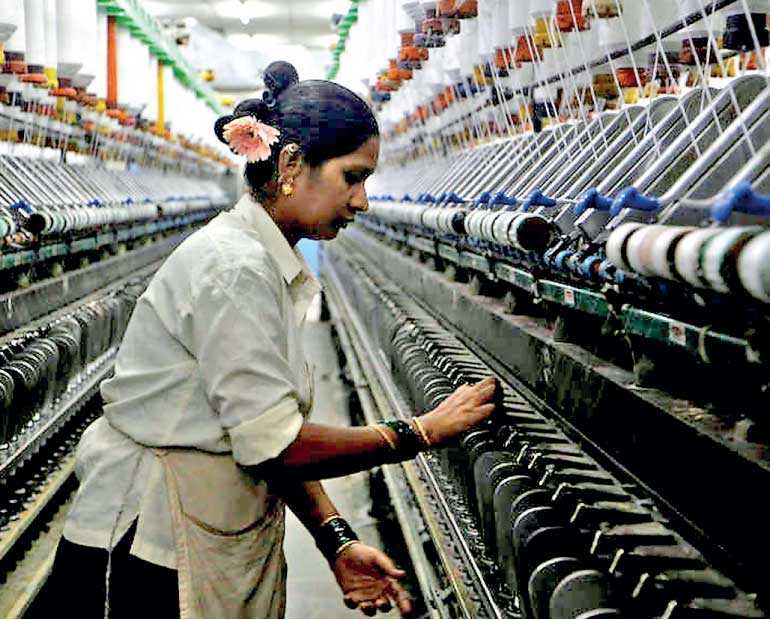Monday Feb 23, 2026
Monday Feb 23, 2026
Monday, 13 August 2018 00:00 - - {{hitsCtrl.values.hits}}

MUMBAI/NEW DELHI (Reuters): China is exporting textiles to India through Bangladesh to get around a tax increase on imports, undermining New Delhi’s efforts to support local manufacturers, industry sources said.
Last week, India doubled the import tax on more than 300 textile products to 20%, marking the second tax increase on textiles in as many months.
This is aimed at providing relief to the country’s domestic textile industry, which has been hit by cheaper imports. India’s total textile imports jumped by 16% to a record $7 billion in the fiscal year to March 2018. Of this, about $3 billion were from China.
Textiles are India’s second largest job provider directly employing nearly 51 million people and accounting for 5% of India’s gross domestic product, and 13% of its export earnings.
Industry officials said textile raw material from China is coming into India via Bangladesh, which has a free-trade agreement with India giving it access to the country’s $100 billion textile market.
“Duty free fabric from China is coming to Bangladesh, getting converted and landing into India at zero duty,” Sanjay Jain, president of Confederation of Indian Textile Industry (CITI) told Reuters.
Industry bodies argue that India’s latest action is not enough to protect domestic garment manufacturers which are facing fierce competition from China and Bangladesh.
Imports of clothing accessories and apparel from Bangladesh – the world’s second largest exporter of ready-made garments -rose over 43% to $200.9 million during the year ended March 2018, according to Indian government data.
“Import trends suggests 40 to 50% of the garments were made with Chinese fibre,” said an Indian analyst who did not want to be named. It is difficult to estimate exactly how many garments imported in India were produced with fibre sourced from China, he said.
India, Bangladesh and Sri Lanka are among the signatories of the South Asian Free Trade Agreement (SAFTA) that created a free-trade zone in the South Asian region.
Shipments of edible oils coming into India are also being designated as duty free under the regional free-trade pact, circumventing an import tax increase.
Trade bodies, which expect textile imports from Bangladesh to rise further, have asked the government to introduce a rule of origin for duty free imports. Competition from China is forcing some businesses, such as polyester production facilities, to run idle, leading to job losses, they said.
“Under the SAFTA agreement and trade agreement with Bangladesh, only those goods should be exempted from custom duty, whose raw material is also manufactured by one of the SAFTA countries,” Dilip Chenoy, head of The Federation of Indian Chambers of Commerce and Industry said in a letter dated 25 July to a senior official in the government’s textile ministry.
Kavita Gupta, India’s textile commissioner told Reuters: “The textile ministry has proposed a ‘Fabric Forward Policy,’ where duty free access to garments will be provided if the fabric is sourced from India. The policy is in discussion stage.”
Rising imports sent India’s trade deficit with China in textile products (finished garments) to a record high $1.54 billion in 2017/18, alarming industry officials as India had been until recently a net exporter of textile products to China.
There is a 10% price difference on average between textile products made in India and those made in China, according to FICCI. The unit value of some Chinese products such as stockings, blouses and baby garments cost far less than produced in India.
NEW DELHI (Reuters): India has launched an investigation into subsidised production and export of welded stainless steel pipes and tubes from China and Vietnam, an official notification said.
The Directorate General of Trade Remedies, which falls under the trade ministry, said there was “prima facie” evidence of subsidies that were hurting the domestic industry. “The authority finds that there is prima facie evidence of existence of countervailable subsidies on production and export of the subject goods in People’s Republic of China and Vietnam, and such subsidized imports are causing material injury to the domestic industry through their volume and price effects,” the notification said.
NEW DELHI (Reuters): India’s industrial output in June grew at its fastest pace in five months to 7% from a year earlier, driven by a pick-up in capital goods manufacturing ahead of the festive season, government data showed on Friday.
Economists surveyed by Reuters had forecast 5.4% growth in output compared with a revised 3.9% year-on-year increase in May.
Manufacturing, which contributes 78% of industrial output, grew 6.9% in June compared with a 2.8% rise in May.